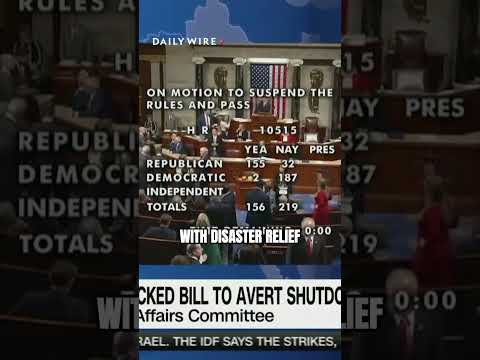The recent chaos in Washington regarding the proposed spending bill illustrates the dysfunction within both parties, but particularly shines a spotlight on the Republican majority’s struggles. Politicians and pundits alike are scratching their heads as it becomes clear that the GOP is not exactly in sync when it comes to budgeting and governance. With 31 Republicans in the House voting against the bill, one has to wonder if the party is more united in principle or in the pursuit of office.
The core of the issue isn’t solely about Democrats playing their usual games. Instead, it is Republicans squabbling amongst themselves. The proposed bill included crucial elements like disaster relief and support for farmers, but the Democrats chose to abstain. Why? Because they felt robbed of their leverage regarding debt ceiling increases. It brings to mind an overly competitive game of tug of war, where each side wants to hold onto the rope, but no one is winning. As a result, Washington, D.C., continues spiraling towards dysfunction and inefficiency.
Representative Lawler’s point about the internal strife among Republicans is a valid one. Rather than pointing fingers at Democrats for not jumping on board given the importance of the bill, perhaps GOP leaders should take a moment to reflect on their own ranks. Voting against important measures escalates the chaos and stalls critical aid, effectively punting the ball down the field instead of making any concerted efforts toward solutions. The overarching sentiment seems to be that if a party is unable to control its members, they cannot reasonably expect to enact any real change.
Furthermore, this situation punctuates a larger trend of politicians prioritizing political gamesmanship over governance. Democrats are strategically using their power—the power to withhold votes—as leverage, which only injects more dysfunction into the system. Both parties need to re-evaluate their approach. Rather than playing a game of chess where each side is waiting for the other to make an error, it might be more productive to work cooperatively, even if that means conceding some political ground.
In conclusion, the current rift within the ranks of the House Republicans not only highlights the issues within their leadership but also serves as a reminder that solutions require teamwork and mutual respect. It is time for Congress to remember why they were elected in the first place. Voters expect real action on behalf of their communities, not just a circus of internal conflicts. As these debates unfold, the American people are left wondering if a true plan exists for the future or, quite frankly, if anyone in Washington is still focused on the job at hand.



